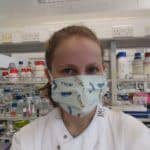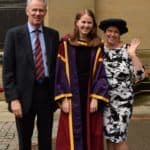Profile
Catriona Cunningham
-
About Me:
I live in Aberdeen, Scotland with my husband and Marzipan, our 20 year old grumpy cat. In my spare time, I love dancing (badly) to keep fit, sewing, reading and playing video games.
-
Read more
I’m originally from a small town in Central Scotland called Falkirk. I can’t remember when I first decided I loved science but I was always curious growing up and loved solving puzzles. I first moved to Aberdeen in 2008 to study medicine. Overall, I really enjoyed my medical degree but as it became more clinical and I gained a better understanding of what being a doctor would be like, I began wondering if it was for me. Between my 4th and 5th years, I did an intercalated BSc where I took a year out of medicine and joined the final year of the Neuroscience degree. It was an incredibly steep learning curve but I had a phenomenal year! I reached a turning point where I realised I loved the science much more than medicine. I therefore decided I wanted to work in science and started looking for PhDs. While I was studying in Aberdeen, I was a really keen archer and joined the university club which is where I met my husband, Johan. We’ve been together for 8 1/2 years and married for nearly 2. He’s been my biggest supporter by far and was happy to move to Manchester with me in 2014 for my PhD then all the way back to Aberdeen in 2019.
In my spare time, I guess I would say I dabble in a lot of different hobbies. I enjoy keeping fit by running and dancing (badly). I’m currently very into sewing clothes while listening to audiobooks. I’m a big cat lover and we have an 20 year grumpy but lovable rescue cat called Marzipan. Her hobbies include sleeping facedown and having socially distanced fights through the window with our neighbour’s cat.
-
My pronouns are:
She/her
-
My Work:
I’m a lecturer in medical sciences. I teach university students about how the body works, what goes to wrong to cause disease and how drugs can be used to fix it.
-
Read more
My official job title is Lecturer in Physiology and Pharmacology but my focus is on physiology, the science of life. I teach both medical students and science students about how the brain and heart work. I run different types of classes including lab practicals, tutorials and lectures. Another very important aspect to the job is the admin side including organising courses and marking.
-
My Typical Day:
My job is really varied so I don’t really have a typical day. It’s on of the things I really love about it. If I take this week as an example:
Monday: practical classes all day looking at the effects of exercise on the heart and circulatory system
Tuesday: meetings with students about their research projects, admin tasks such as marking
Wednesday: medical student assessed presentations and problem solving tutorials
-
Read more
I did have something more like a typical day in my previous job as a research fellow. I’d start work around 8.30/9.00 am by checking emails and handling any admin tasks such as ordering for the lab (e.g. chemicals, flasks for growing cells). If I didn’t have any meetings scheduled (e.g. catch ups with my supervisors, group lab meetings) I’d spend the rest of the morning on desk-based tasks such as analysing data, giving feedback on students’ work and writing. This job did involve quite a lot of writing including grants to get additional research funding and writing up research papers. Some researchers I know absolutely hate writing but I’ve always really enjoyed it! From a lot of experimenting, I’ve found late morning to early afternoon seems to be the time of day I get my best writing done which is why I often structured my days this way. After lunch with my husband, I’d go into the lab for the afternoon. This might include checking and feeding my cells or taking images on the microscope. I might also help the PhD students by training them to do some lab techniques or giving advice. I’d head home at 5.30/6 pm to do some exercise and have dinner.
-
What I'd do with the prize money:
I would love to put it towards visiting local schools with some colleagues to talk about careers in science and run some interactive activities. The one that’s top of list is to bring in real sheep brains that pupils can pick up and hold to help learn about neuroanatomy. It’s an activity we ran in my previous lab in Manchester and it was always a big hit!
-
Education:
Wallacestone Primary
Braes High School
University of Aberdeen: 2008-2014
University of Manchester: 2014-2018
-
Qualifications:
2006: Standard grades (old Scottish equivalent to GSCEs) in English, Maths, Chemistry, Biology, Physics, Music, History and French
2007: Highers (like AS levels) in English, Maths, Chemistry, Biology and History
2008: Advanced Highers (like A levels) in Maths, Chemistry and Biology
2013: BSc (Hons) Neuroscience with Psychology (intercalating), first class honours, 2013
2014: MBChB Medicine
2018: PhD Regenerative Medicine
-
Work History:
2014-2018: PhD Student, University of Manchester. My thesis focussed on stem cell-based therapies to repair the injured brain after stroke.
2018-2019: EPSRC Doctoral Prize Fellow, University of Manchester
2019-2021: Research Fellow, University of Aberdeen. My lab work focussed on exploring novel combination therapies to promote spinal cord injury repair.
2021-2023: Teaching Fellow in Physiology and Pharmacology, University of Aberdeen
-
Current Job:
Lecturer in Physiology and Pharmacology
-
Employer:
University of Aberdeen
-
My Interview
-
How would you describe yourself in 3 words?
Crafty cat-loving neuroscientist
What did you want to be after you left school?
A doctor specialising in Neurology or Rehabilitation Medicine
Were you ever in trouble at school?
No but I was at Brownies because I was bored!
Who is your favourite singer or band?
It's too hard to pick one. I like everything from metal and pop to classical music and Broadway soundtracks.
What's your favourite food?
Pizza
If you had 3 wishes for yourself what would they be? - be honest!
To become an excellent lecturer who makes a difference, spend more time with friends and family, be happy
Tell us a joke.
What kind of fish does brain surgery? A neurosturgeon
-











